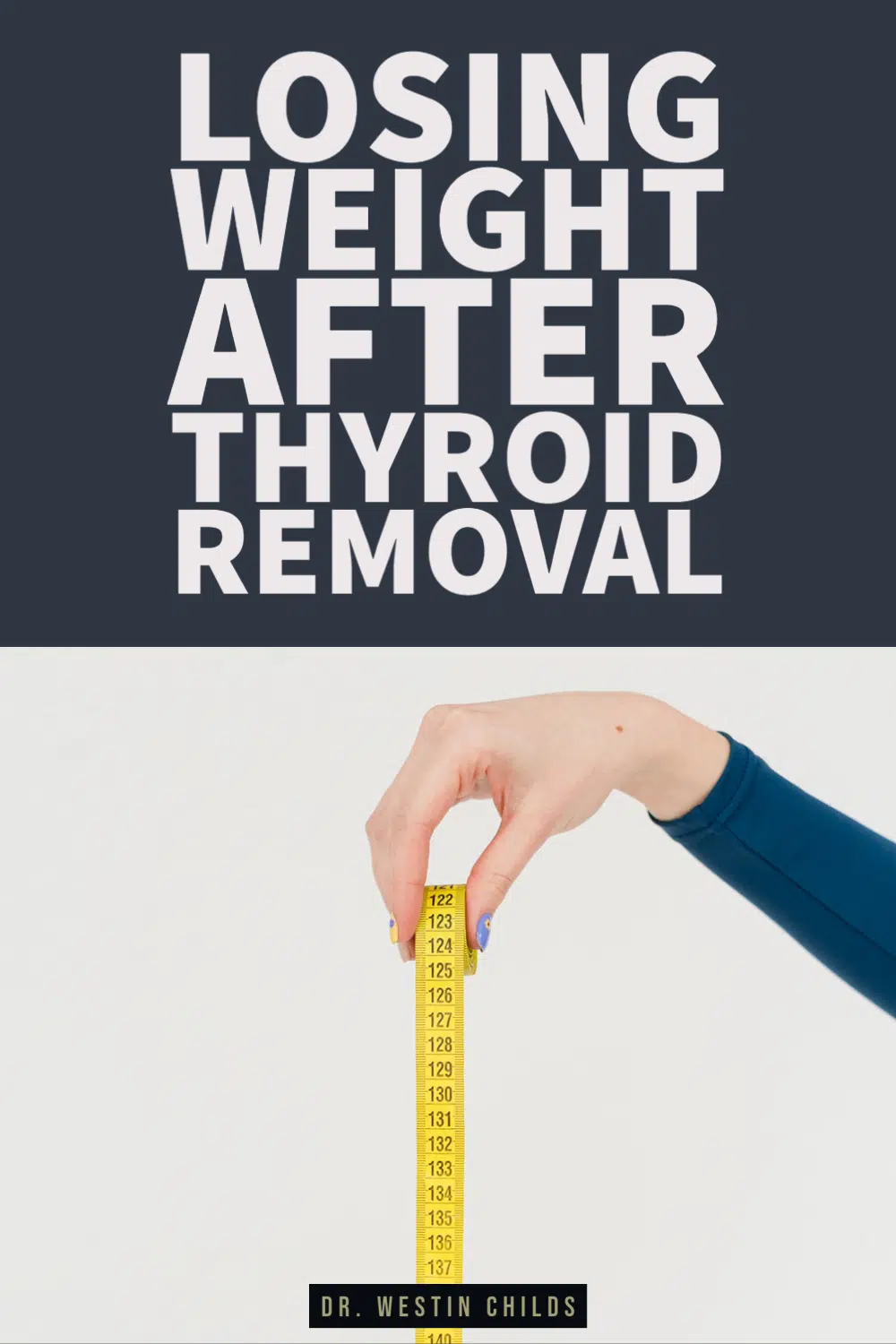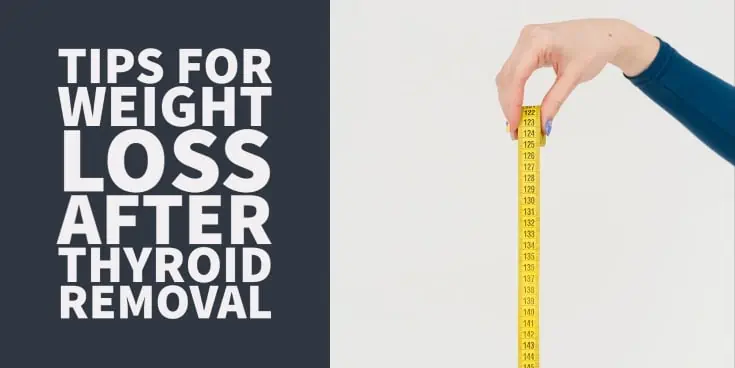Almost every patient gains weight after having a thyroidectomy.
In fact, it’s considered normal to gain 20-30 pounds and most doctors just shrug it off as “normal”.
When you consider that thyroid hormone controls the metabolism of your entire body and that after removing it most patients gain 20-30 pounds, shouldn’t we at least consider that something is wrong here?
Maybe our current treatment recommendations might be flawed.
It just seems logical, right?
I hate to break it to you, but most doctors don’t think twice about it. And there aren’t a lot of resources for patients after they get a Thyroidectomy.
But here’s the deal:
Patients who have had a total thyroidectomy deserve special attention because their situation is unique, and they shouldn’t be treated like all other thyroid patients.
Luckily, there are some tips and tricks you can use to help with weight loss after thyroidectomy and I’m going to share them with you here…
DOWNLOAD FREE RESOURCES
Foods to Avoid if you Have Thyroid Problems:
I’ve found that these 10 foods cause the most problems for thyroid patients. Learn which foods you should avoid if you have thyroid disease of any type.
The Complete List of Thyroid Lab tests:
The list includes optimal ranges, normal ranges, and the complete list of tests you need to diagnose and manage thyroid disease correctly!
Why Do Patients Gain Weight After Thyroidectomy?
It’s well known that many patients (especially women) gain weight after having their thyroid removed.
In fact, it’s been shown that women who have a total thyroidectomy gain more weight than patients with hypothyroidism (1).
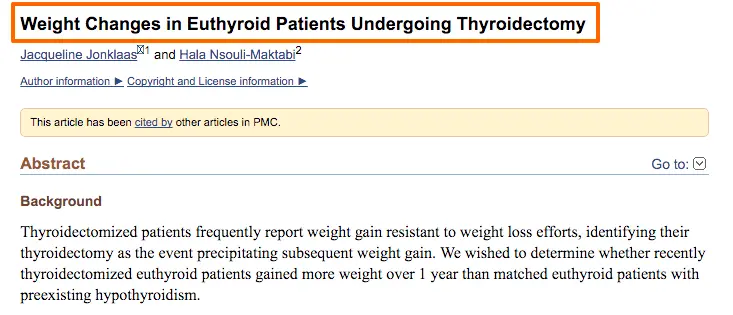
And, let’s face it:
Most Doctors don’t do a good job of treating hypothyroidism, otherwise, websites like this wouldn’t exist!
And, following the trend, doctors typically do an even worse job in treating post-thyroidectomy patients.
Let’s take a minute and talk about weight gain after thyroidectomy.
Why are patients gaining so much weight?
The truth is that regulating hormones is very complex.
The thyroid system in your body is no exception.
And the medical world doesn’t have a great track record in balancing and regulating hormone levels.
Take for instance Type I Diabetes:
Medicine has developed near-continuous blood glucose monitoring systems and we still don’t do a great job of controlling blood sugar (2).
Now compare that to your thyroid.
How often are you getting your labs tested? How often is your medication being changed? Are you feeling any better about those changes?
It might be time to make a change to our current treatment paradigm, or at least consider the fact that we don’t have it all figured out.
In order to understand why our current treatment doesn’t work, we have to understand why we actually gain weight…
Weight Gain is Not About Calories
Weight gain is not about eating too many calories or not exercising enough. Period.
It’s about an imbalance in your hormones.
How else do you explain the sudden weight gain in post-thyroidectomy patients despite eating the EXACT same foods before and after?
Or how about the weight gain associated with menopause (3)?
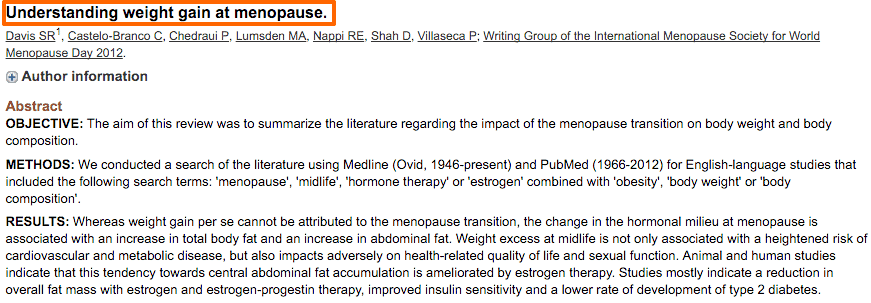
Do these women just happen to magically start eating more and exercising less at the precise time their estrogen levels drop (in the case of menopause) or their thyroid levels drop (in the case of thyroidectomy)?
Obviously not.
Weight gain is a hormonal problem!
And to fix it we have to fix the hormonal imbalance.
Unfortunately, the current paradigm is set to make you believe that in order to lose weight you must eat less and exercise more.
You even get this kind of advice from places like the Mayo Clinic (4) and Livestrong…
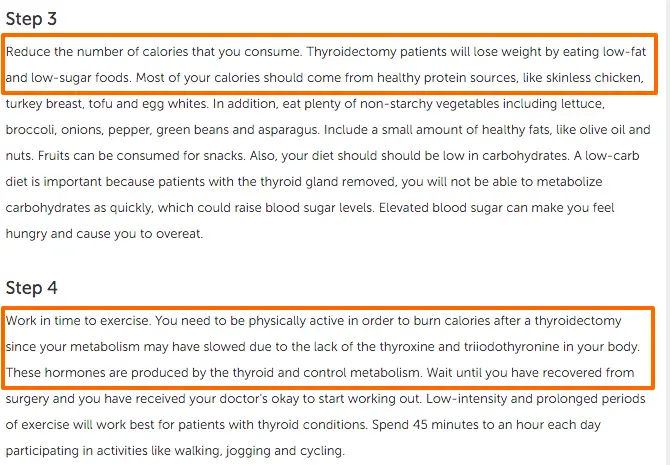
This is bad advice, so please don’t follow it. (Check out this post on nutrition facts that should be common sense but aren’t for more info)
In fact, reducing your calories has been shown to reduce your overall metabolism, and may make your thyroid function even WORSE (5).
Dieting leads to low levels of Free T3 and higher Levels of Reverse T3 which means you’re going to slow down your metabolism even more.

I know what you’re thinking:
I don’t have a thyroid and I take medication so it doesn’t matter to me.
Not true at all.
If you’re on T4 medication your body must convert it to the active Free T3 in order for it to work.
And your body can still turn it into Reverse T3 as well.
So it definitely still matters to you.
What about Diet after Thyroidectomy?
The truth is that diet is still important for weight loss in Thyroidectomy patients, but not as you think.
I don’t want you to think you need to restrict your calories to lose weight (that won’t work).
But it is still important for you to eat a HEALTHY, nutritious, and whole-food diet.
If you don’t know what that is you can find a lot of information about it here.
And, to answer your question, yes it will work for patients with a sluggish thyroid and for those without a thyroid.
So in addition to eating a whole food diet, what other things will help with weight loss after thyroidectomy?
Let’s jump into some tips that can actually help you lose weight if you no longer have a thyroid.
Weight Loss After Thyroidectomy Tips
Some of these tips you will be able to do on your own, but some may require a visit to the doctor’s office.
So it’s in your best interest if you can find a doctor who is willing to work with you and your condition to get you the best possible results.
I typically recommend doctors with training in functional medicine and preferably MDs or DOs who can prescribe thyroid medications.
1. Get On the Right Type and Dose of Thyroid Medication
This is a critical step and the first place I recommend you start. (It can also be the toughest part because it requires a doctor to prescribe you the RIGHT medication)
As I’ve mentioned before your thyroid controls the metabolism of your body.
And currently, we have an epidemic of thyroid patients that are being undertreated.
To understand why this is you need some basic understanding of thyroid physiology:
There are 2 main types of thyroid hormone that your doctor can prescribe.
T4 = The inactive thyroid hormone <— This is what most Doctors prescribe and very few people do well on this medication (Yes I said that it is inactive by itself)
T3 = The ACTIVE hormone <— Most people do better on this medication (6) but most Doctors don’t prescribe medications containing T3

For more information on thyroid medications check out this post here.
Most people do better on medication that contains the T3 hormone and studies show this to be the case.
Patients on Natural Desiccated Thyroid hormone (a medication that contains T3) lose more weight and have better satisfaction than patients on levothyroxine (the medication you are most likely taking).
Why is this?
It turns out that your thyroid produces both T4 and T3 medications (when it’s functioning normally).
It produces about 80% T4 and about 20% T3 (7).
When your thyroid is gone most patients are given T4 medications ONLY (remember that this is the INACTIVE hormone).
As a result, most patients develop weight gain and symptoms of hypothyroidism.
So what can you do?
Whenever possible I recommend attempting to mimic nature. That means dosing your thyroid with 20% T3 and 80% T4.
If your doctor is willing to work with you, you have a couple of options:
Get on Natural Desiccated Thyroid Hormone which contains roughly around an 80/20 ratio of T4 to T3 – in addition to other less biologically active thyroid hormones.

Add Cytomel or liothyronine to your dose of T4 – Let’s say that you are currently on 100mcg of T4. In this case, I would simply add 20-25mcg of T3 medication to your regimen (note: you may need more or less depending on how sensitive you are to this medication).
Adding T3 medication to your regimen can drastically improve your overall symptoms and metabolism thus leading to more weight loss.
And remember:
After thyroidectomy, the ONLY way you are getting T3 is in the form of medication.
2. Optimize your Free T3 Levels
Under normal circumstances, your body must produce free T3 from T4 (unless you provide T3 directly via medication).
The problem is that your body can also turn T4 into Reverse T3 which is a thyroid blocker (it sits on free T3 receptors on the cells and blocks the action of thyroid hormone).
Because of this, it is important to optimize this system and make sure your body is producing as much free T3 as possible and as little reverse T3 as possible.
I’ve gone into a lot of detail on how to increase your free T3 levels naturally in this article, but I will also go over some useful info here as well.
In order to optimize free T3 levels you will want to do the following:
- Take supplements that increase T4 to T3 conversion like zinc, selenium, and B6
- Get off of medications (if possible) that block (8) T4 to T3 conversion like antidepressants, narcotics, mood stabilizers, pain modulators, blood pressure medications, and diabetic medications. You can find an entire list of supplements and medications that interfere with thyroid function here.
- Heal any digestive issues you may be dealing with like acid reflux, bloating, or irritable bowel syndrome – use a high-quality multi-strain weight loss probiotic.
- Make sure your iron levels are in the “optimal range” (more info in this article here)
- Reduce inflammation in the body (high levels of inflammation promote reverse T3 production)
Bottom line:
Higher free T3 levels = Higher metabolism = more weight loss
Increase these levels naturally with supplements or artificially with medications, but either way, you will want your free T3 levels as high as possible (but still within natural physiologic ranges).
3. Balance ALL Hormonal Systems in the Body
Balancing your thyroid is just one piece of the weight loss puzzle.
In fact:
I’ve never seen a thyroid patient with just ONE hormonal imbalance, and patients with weight loss resistance tend to have several.
And it’s also important to remember that hormones interact with other hormones!
For instance, thyroid hormone interacts with progesterone (9), cortisol (10), and insulin levels (11).
This is especially true in patients without a thyroid.
To make your weight loss efforts MOST effective you will want to evaluate the following hormones:
- Insulin Levels – High levels of insulin (AKA insulin resistance) cause weight gain in the belly. More info here.
- Estrogen Levels – High levels of estrogen and low levels of progesterone promote weight gain in the hips/butt and thighs.
- Testosterone Levels – Low levels of testosterone cause depression, weight gain, and reduced muscle mass.
- Leptin Levels – Leptin resistance causes increased appetite, low metabolism, and chronic weight gain. Find out how to reverse it here.
- Cortisol – Adrenal fatigue leads to weight gain in the belly, reduced energy, and inability to tolerate stress. Almost EVERY thyroid patient has issues with cortisol.
Use the following guides to help balance these hormones:
- Learn how to use progesterone safely and correctly for weight loss here
- Learn how to use powerful supplements such as Berberine and Alpha lipoic acid to help with weight loss and improve insulin signaling
- Learn how to deal with Testosterone and DHEA here
- Learn how to lower Leptin levels with targeted supplements here
I’ve included a table below that will teach you what tests to ask for and how to determine if your hormones are out of balance:
4. Be Strict with your Diet but Don’t Restrict Calories
When I use the word diet I am referring to the food that you eat.
I’m not referring to DIETING or eating a calorie-restricted diet.
In fact, eating a calorie-restricted diet will actually make your thyroid function worse (12).
Since we’ve already discussed diet in this article I won’t go over it much more except for some general guidelines:
- Stick to Organic Food groups and Grass-Fed/Organic Meats
- Don’t be afraid of eating Healthy Fats
- Eat lots of Vegetables
- Don’t snack every 2-3 hours
- Avoid Processed foods or anything that comes in a box or package
- Avoid sugar and artificial sweeteners as much as possible
5. When your Energy Improves make Exercise Count
It may be difficult to think about exercising when you are suffering from fatigue after your thyroidectomy (another sign that you are being undertreated), but I can’t underscore how important exercise is for your health.
Exercise isn’t important because you are “burning calories”.
It’s important because it helps to balance hormones in your body (13), release endorphins (14), and stimulate neurotransmitter release (15).
Even if your energy levels are low, I recommend that you start with low-intensity exercise on a daily basis:
That can be walking for 30 minutes per day.
Once you have a handle on low-intensity exercise, you can then start to add in slow-weight training and high-intensity exercise.
These types of exercise have been shown to be more effective than traditional “aerobic” exercise and have the additional benefits of building muscle mass and taking up less time than standing on a treadmill for hours.
Putting it all Together
I know that it can seem impossible to lose weight after thyroidectomy, but let me tell you that it IS possible and I’ve helped MANY patients do it.
It just takes a systematic approach and a sympathetic physician.
Because getting on the right type and dose of thyroid medication (preferably medication that contains T3!) is so important I recommend that you find a Doctor who is willing to work with you.
In addition, you will need to find someone who will look at your other hormone levels and treat them appropriately.
The other aspects: Diet, exercise, lifestyle changes, and supplements/vitamins – are things that YOU can take care of.
Also, remember that healthy weight loss may take months to achieve. But once you are able to lose pure fat mass without losing muscle mass, your weight loss will be long and lasting.
Now I want to hear from you:
What have you done to lose weight after your thyroidectomy?
What has worked, and what hasn’t?
Was changing your thyroid medication helpful?
Leave your comment below!
Further resources:
Weight changes in euthyroid patients undergoing thyroidectomy (16).
Weight changes in patients with thyroid cancer after thyroidectomy (17).
Weight gain in hyperthyroid patients after thyroidectomy (18).
More studies show weight gain in hyperthyroid patients after thyroidectomy (19).
Scientific References
#1. http://www.ncbi.nlm.nih.gov/pmc/articles/PMC3229816/
#2. http://www.ncbi.nlm.nih.gov/pubmed/8299480
#3. http://www.ncbi.nlm.nih.gov/pubmed/22978257
#4. http://www.mayoclinic.org/healthy-lifestyle/weight-loss/basics/weightloss-basics/hlv-20049483
#5. http://www.ncbi.nlm.nih.gov/pubmed/6771066
#6. http://www.ncbi.nlm.nih.gov/pubmed/23539727
#7. https://www.ncbi.nlm.nih.gov/books/NBK499850/
#8. https://www.ncbi.nlm.nih.gov/pubmed/20578900
#9. http://www.ncbi.nlm.nih.gov/pubmed/9846161
#10. http://www.ncbi.nlm.nih.gov/pmc/articles/PMC3520819/
#11. http://www.ncbi.nlm.nih.gov/pmc/articles/PMC3356957/
#12. https://www.ncbi.nlm.nih.gov/pubmed/12055988
#13. http://www.ncbi.nlm.nih.gov/pubmed/10683091
#14. http://www.ncbi.nlm.nih.gov/pubmed/6091217
#15. http://www.ncbi.nlm.nih.gov/pmc/articles/PMC2077351/
#16. http://www.ncbi.nlm.nih.gov/pmc/articles/PMC3229816/
#17. http://www.ncbi.nlm.nih.gov/pmc/articles/PMC4595360/
#18. http://www.ncbi.nlm.nih.gov/pubmed/24522995
#19. http://www.ncbi.nlm.nih.gov/pubmed/11531931
